Energy News Beat
President Claudia Sheinbaum has diversified Mexico’s trading partners and held regional talks on migration.
Welcome back to Foreign Policy’s Latin America Brief.
Mexico Girds Against Trump’s Threats
True to his campaign rhetoric, the first days of U.S. President Donald Trump’s second term have featured Latin America prominently. Trump mentioned Panama six times in his inaugural address, echoing his previous threats to try to regain control of the Panama Canal. U.S. Secretary of State Marco Rubio will take his first foreign trip to Panama and other Central American and Caribbean countries next week.
Most of Trump’s initial concrete actions toward the region came in the form of U.S. immigration policy, especially at the U.S.-Mexico border.
The administration lifted a restriction on arresting migrants at churches and schools, shut down an app that allowed certain asylum-seekers to book appointments, and ordered the resumption of the “remain in Mexico” policy, under which some asylum-seekers were required to wait in Mexico for their U.S. immigration court hearings.
Another Trump administration directive this week aimed to completely shut down the right to asylum at the U.S. border. Agents were told to immediately expel migrants even if they sought asylum, CBS reported on Wednesday, with very few exceptions for “life-threatening” situations.
Mexican President Claudia Sheinbaum has pushed back against some of the new U.S. migration plans. But she has signaled cooperation with others—perhaps an acknowledgement of Trump’s 25 percent tariff threat on Mexican goods.
The United States cannot deport people to a country if it does not agree to take them back. Sheinbaum has said that Mexico will accept deported Mexican citizens and even those of other nationalities, aiming to eventually repatriate them. That group could include migrants from countries that have strained diplomatic relations with the United States, such as Cuba and Venezuela.
Sheinbaum, however, stopped short of agreeing to accept foreign asylum-seekers as part of the resumption of “remain in Mexico,” she told reporters on Wednesday. Mexico’s foreign minister had spoken to Rubio the day before.
In a sign that Latin American countries are seeking to coordinate their stances on immigration policy, envoys from 10 countries met in Mexico City last week and released a joint declaration calling for the respect of international law and pledging “close communication.” Without naming the United States, the declaration called for a “humanistic approach … in the face of the threat of mass deportations.”
Mexico has also staffed its U.S. consulates with immigration lawyers and launched an app for both documented and undocumented Mexican immigrants in the United States. It details their rights and allows them to alert emergency contacts and consular staff if they think that they might be detained by U.S. authorities.
Beyond immigration, Mexico agreed last Friday to expand its existing free trade deal with the European Union. The new agreement will remove tariffs on agricultural products and ease companies’ abilities to bid on public contracts in partner countries. It also facilitates trade in services, while the previous deal was focused on industrial goods.
As with last December’s Mercosur-EU deal, Trump’s protectionist threats were a key factor in pushing the Mexico-EU deal across the finish line. Mexico is also seeking to expand its trade relationships with the United Arab Emirates and Brazil, the country’s economy minister and foreign minister said recently.
Like the deal with Mercosur, the revamped Mexico-EU agreement still needs to be approved by legislatures on both sides. For now, it stands as a symbol that Mexico is diversifying its partners as its northern neighbor grows more unpredictable.
Upcoming Events
Week of Jan. 27: U.S. Secretary of State Marco Rubio begins a trip to Panama, Guatemala, El Salvador, Costa Rica, and the Dominican Republic.
Saturday, Feb. 1: U.S. President Donald Trump has suggested that he might impose 25 percent tariffs on all goods imported from Mexico and Canada on this date.
The post Mexico Responds to Trump’s First Moves appeared first on Energy News Beat.









